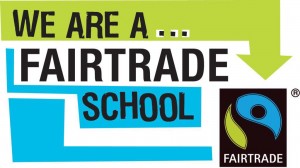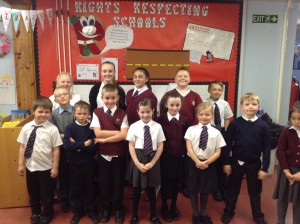Some Commonly Asked Questions:
Why are children learning about their rights in school and what is meant by ‘rights’?
In signing the UNCRC all Governments have a responsibility to make both children and adults aware of these rights. Schools are the best place to reach the vast majority of children.
These ‘rights’ are not the same as ‘wants’. Rights are the basic human needs and values that apply or should apply to everyone, for example:
The right to water
The right to an education
The right to nutritious food
The Unicef website outlines the articles in more detail and can be found at: www.rrsa.unicef.org.uk
How does teaching about children’s rights fit in with the curriculum at St. David’s?
Learning about rights naturally lends itself well to many curricular areas, including:
Literacy, Social Studies, R.E, Science and Health and Wellbeing. All our teaching and support staff have received training on how to incorporate rights based lessons into their planning.
Does the UNCRC talk about responsibilities?
Yes, with rights come responsibilities.
The children learn that they have the responsibility to respect the rights of others. These matching rights and responsibility statements are created by the children and then used to develop in each class their Class Charter.
What about children’s respect for the rights of others?
Research has shown that when children are taught in school about their rights and responsibilities under the UNCRC, they are more respectful of the rights of others.
Children who have learnt about their rights show:
A better understanding of what it means to have rights and responsibilities
More positive attitudes to school
Better relationships with their class
There is also a Whole School Charter in place which was written in collaboration with the children. It includes the following Rights and Responsibilities:
Rights
1. We have the right to the best education possible with staff who will be good role models and give us great opportunities to learn.
2. We have the right to have our thoughts and beliefs respected and to learn about other religions and cultures.
3. We have the right to be kept safe in school and benefit from a productive learning environment.
4. We have the right to develop our talents and personality to the full.
5. We have the right to relax and play with friends and join in a wide variety of activities.
Responsibilities
1. We have the responsibility to try our best in everything we do and to make the most of every opportunity to learn.
2. We have the responsibility to respect the beliefs and opinions of others.
3. We have the responsibility to act sensibly and safely all the times and to treat our school environment and peers with respect.
4. We have the responsibility to try our best to develop our personality and special talents.
5. We have the responsibility to be a kind friend as well as to include others, respect playtime equipment and make the most of school clubs.
At St.David’s we have UNICEF ambassadors, who work hard to help others in the school learn all about the important work of UNICEF. Our ambassadors are selected from Primary 1 – Primary 7 and over the course of the year will participate in regular meetings, leading assemblies and raising awareness of UNICEF inititives.
If you can support our school’s efforts please contact Miss Kelly to discuss further.

